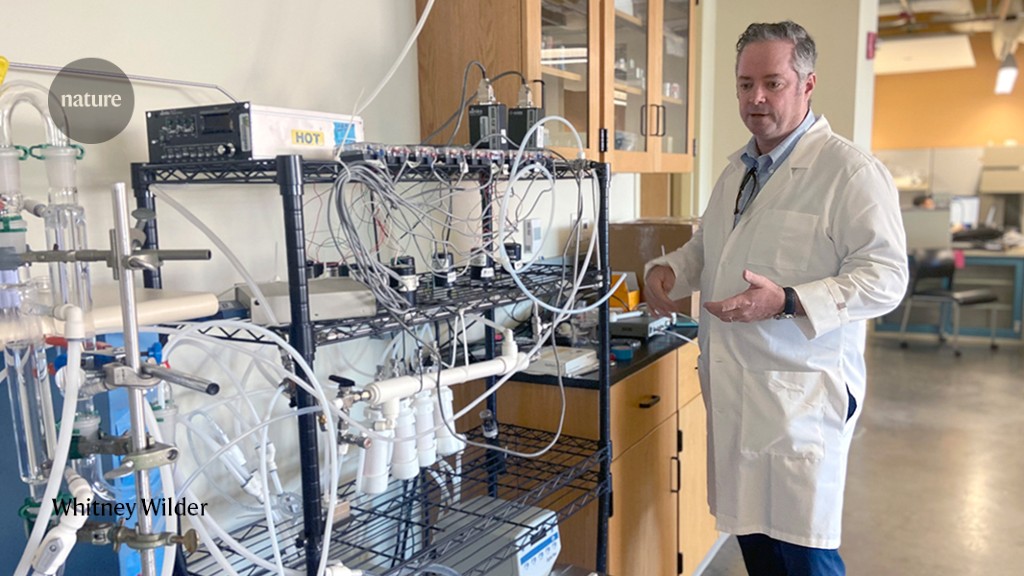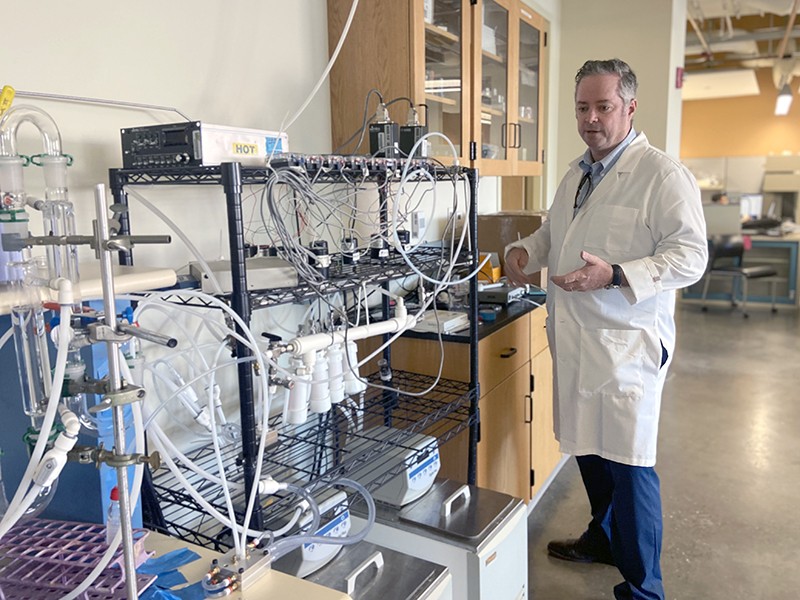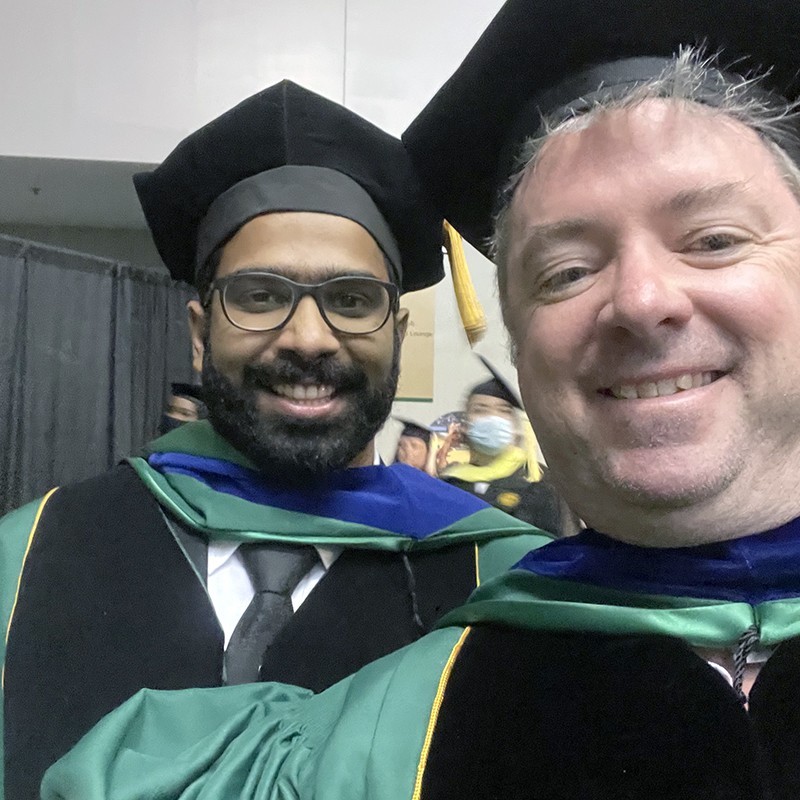In January 2017, after another especially difficult day at the office, I again complained to my wife about feeling professionally unfulfilled and hankering for a career in academia, running my own engineering laboratory.
At the time, I was in management for Unbounded Labs, a technology company based in Tampa, Florida. Before that, I’d held engineering and management posts at companies including Rubbermaid in Wadsworth, Ohio, and Little Tikes in Hudson, Ohio.
None of these jobs was bad, but I had always wanted to do research, add something important to the world, and also teach the next generation how to do likewise.
My wife provided the clarity that I needed, saying: “You are going to be 50 in a few years; do you want to be 50 and be an academic or do you want to be 50 and still complaining about not being a professor?” That was really the push that I needed to call my local university, the University of South Florida in Tampa, and ask about becoming a part-time graduate student. To my surprise, I was told I should sign up for some classes right away. To prepare myself for taking on a PhD, I spoke to my employer and agreed to maintain all my current responsibilities in exchange for a more flexible schedule.
My company saw the value in having a leader who was keen on self-improvement and who would be committed to the organization for the next five years, bringing stability to my team. I focused my discussions with management on performance and not on hours in the office: I knew I wouldn’t be there as much, but I hoped it wouldn’t matter in terms of results.
In 2017, on my first day of graduate classes, I made my way to the lecture theatre with much trepidation, feeling old and out of place among students 20 years my junior. I arrived early and sat at the back hoping not to be noticed.
A few minutes later, two students — Dave and Kevin — sat next to me and started to include me in their conversation right away. That was all I needed to feel comfortable. Suddenly I was part of the class. They graduated in 2018 but were always a part of my journey.
Five years later, I am graduating aged 51 with my PhD in chemical, biological and materials engineering. It’s been both the best experience in my life and one of the toughest things I’ve ever done.
Master time management to be successful
Most university graduate programmes are designed for students who have just finished their undergraduate degree, have few outside commitments and can spend most of their time in class or the lab. By contrast, many midlife students will have a mortgage, a partner, kids (two boys, in my case, aged 11 and 13), and perhaps also a full-time job, with less time available to physically be at the university.
My days would typically start with two hours in the lab, from 7 to 9 a.m., after which I’d work until 2 p.m. at my job. On two days a week, I returned to the lab until 4.30 to teach a senior chemical-engineering class. And twice a week I would leave work to attend classes for an hour and a quarter and then return to work. I then went home to play with the kids until we put them to bed at around 9 p.m., after which I’d study until 11. In reality, I worked 12 hours a day during the week and 6 hours a day at the weekend, mixed between work and school to try to keep whatever commitments I’d made for that day. I must also thank my wife, Rachel, for all her support during my PhD as she took over taking the boys to sports while I wrote papers — as well as cooking all the meals while I worked through research problems, and picking up a part-time teaching job to make extra cash, given that I never got a pay rise from my company while I was working on my PhD.
I would definitely not recommend working so many hours every week. My productivity and mental state both suffered; better time-management skills would have allowed me to work less and accomplish more. In the final couple of years, I delegated more things to my team at work — something I should have done years ago — and saved myself a lot of extra time and effort.
The limited time I’ve been able to spend in the lab has been a constant source of friction with my adviser. I wanted to be there more, but I was barely hanging on managing all my responsibilities. Often, I would be in the lab in the early morning and finish the analysis when the kids were in bed. Using these quiet times enabled me to get a lot done. I would suggest that this is something that needs to be discussed and agreed upon with your adviser, at the start of graduate studies, so that expectations are established.
Finding external funding helped to support me
I worried about the cost of my PhD course. My university charges US$65,500 for a 5-year programme, which was a struggle for me. My adviser suggested I apply for a NASA fellowship, to study additive manufacturing of optical-fibre interconnects and devices, and that helped to pay for my tuition. My teaching-assistant salary covered most of my remaining tuition fees, but I still had to spend thousands of dollars more. I recommend starting a PhD with a programme that offers you a stipend immediately, and also that you work hard for fellowship and grant money.
Academia is still possible
I was told many times that, at my age, a position at a leading institution was out of the question, and that universities want only young researchers who will be productive for decades. However, I am proud to write that I am starting a position as a professor at the University of South Florida in January 2022. So, a job in academia is definitely possible for a midlife PhD holder.
I am so glad that I finally took the plunge and got my PhD. I waited 20 years to start, but I did it and I am so excited about my new life. My dream job in academia is starting in just a couple of months, and in the town where I currently live. Not having to move makes everyone in the family happy. As a professor working half the hours of a full-time post, I will be able to teach and do research as well as have some flexibility to continue to work with my current employer in a paid consultancy role and continue to help the company grow.
In December of 2021, I tried on my graduation regalia for the first time with my family. Everyone was excited and proud of what I had accomplished. I think I have set a great example to my two young sons of what is possible, regardless of your age. My experience was very different from what I thought it would be, but I am so delighted to have finally completed my PhD.









More News
Star Formation Shut Down by Multiphase Gas Outflow in a Galaxy at a Redshift of 2.45 – Nature
Garden-variety fungus is an expert at environmental clean-ups
Air-travel climate-change emissions detailed for nearly 200 nations